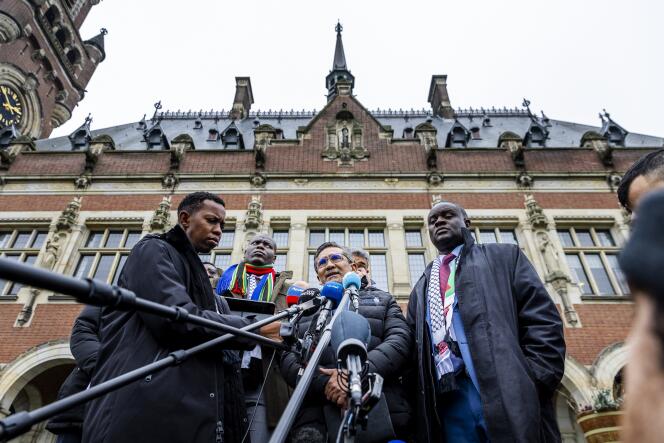


"It is an unusual experience for a lawyer," said Tembeka Ngcukaitobi in the international arrivals hall at Johannesburg airport on January 14. A welcome committee had come to celebrate the return of the South African legal team which, on January 11 and 12, brought charges of genocide in Gaza against Israel before the International Court of Justice (ICJ) in the Netherlands.
Two months earlier, the Springboks, world rugby champions, were welcomed in the same location. "South Africa stands on the right side of history," read the local press and social media. The African National Congress (ANC), the party in power in Pretoria, has been a staunch supporter of the Palestinian cause since it came to power in 1994.
Nelson Mandela, whose bronze portrait is displayed in the Peace Palace that houses the ICJ in The Hague, was not only the man who won the Nobel Peace Prize but also an advocate of the Palestinians' right to independence. When South Africa calls Israel an "apartheid regime," it is linking the fate of the Palestinians to its own history.
In reaction to the carnage caused by the Israeli bombardment of Gaza, responsible for the deaths of over 24,000 people, Zane Dangor, head of South Africa's Department of International Affairs, denounced, in an op-ed published by the media outlet News24, the general failure of the institutions of global governance to stop the shameless murder of the Palestinian people. He expressed that despite their shortcomings, South Africa would not like to see confidence in international institutions deteriorate further.
Disenchantment often prevails, as evidenced in 2016 when South Africa began the process of withdrawing from the International Criminal Court (ICC), only to later reverse this decision. Or when suspicions of withdrawal resurfaced in 2023 when it planned to receive Russian President Vladimir Putin at the BRICS summit without arresting him, despite the international arrest warrant issued by the ICC for alleged war crimes committed in Ukraine. Pretoria also refused to arrest former Sudanese president Omar Al-Bashir on a visit to South Africa in 2015 despite genocide charges brought by the ICC.
More recently, on January 4, Cyril Ramaphosa, hoping to play a mediating role in Sudan, hosted the Sudanese militia leader Mohamed Hamdan Daglo, known by his nickname "Hemetti," at his residence. He is accused of having been one of the architects of the killings in Darfur, and his men continue to commit atrocities in the current battle for power in Khartoum.
You have 60% of this article left to read. The rest is for subscribers only.
